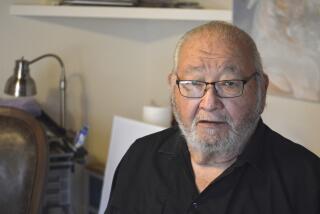Pomona professor, poet and translator Robert Mezey dies
- Share via
Robert Mezey, award-winning poet, cutting-edge anthology editor and charismatic Pomona College professor, has died. He was 85.
His daughter Naomi Mezey reported that the author passed away April 25 from pneumonia at a nursing home in Bowie, Md.
Brilliant, mercurial and often rebellious, Mezey came to artistic maturity in the 1960s. His footloose early career embodied the challenges and changes of that dramatic period in American letters.
Born in Philadelphia in 1935, Mezey proved a precocious but restless student. Already sure of his literary vocation, at 16 he entered Kenyon College where he studied with the influential poet-critic John Crowe Ransom.
At Kenyon Mezey also made friends with two older students returning from military service — novelist E.L. Doctorow and poet James Wright. Despite the supportive milieu, Mezey dropped out after two years.
The poet soon found himself in the U.S. Army but was discharged early, he later claimed, as a “subversive.” He then attended the University of Iowa, where he finished his B.A.
Encouraged by poet Donald Justice, who became a lifelong friend, Mezey began graduate studies at the Iowa Writers’ Workshop. Once again, he dropped out — but for a happier reason. His first book, “The Lovemaker” (1960), had won the Lamont Poetry Prize.
On the basis of that debut volume, Mezey received the Stegner Fellowship at Stanford, but the start of the fall semester found him in Mexico rather than Palo Alto. His new mentor, the rigorously formalist poet Yvor Winters, had to send him money to travel back to the U.S. Their relationship soon soured.
Although he still lacked a graduate degree — a situation that would not change until Kenyon awarded him an honorary doctorate in 2009 — Mezey taught briefly at several universities. His departures were sometimes abrupt.
At Franklin and Marshall College in Pennsylvania, Mezey urged his students to burn their draft cards. Offered his full year’s salary, he made an early exit.
Meanwhile Mezey’s poetic style changed; he followed the zeitgeist into free verse. “When I was quite young,” he wrote, “I came under unhealthy influences — Yvor Winters, for example, and America, and my mother, though not in that order.”
Mezey explored his new aesthetic in a series of books, including “White Blossoms” (1965) and “A Book of Dying” (1970). When his new and selected volume, “The Door Standing Open” (1970) appeared, he labeled a short section of his early rhymed verse “Someone Else’s Poems.”
His poetic rebellion reached its apex with the publication of “Naked Poetry” (1969), co-edited with Stephen Berg. This polemical anthology proclaimed the abandonment of metrical poetry and the rise of “open forms.” No literary book better expressed the mood of the historical moment.
In 1976, Mezey’s itinerant life found a happy resting place when Pomona College offered him a position. “The best job of my life,” he called it. He taught at Pomona until his retirement in 2000 and sporadically afterward. The college never granted him tenure, but it eventually promoted him to full professor.
Not an academic by temperament, Mezey proved an inspiring teacher. Poet Jodie Hollander called him “a wonderful but very demanding mentor.” John Darnielle, founder of the Mountain Goats, has described Mezey’s instruction as crucial to his skill as a lyricist. “Every single day of my life,” he claimed, “I am grateful to the poet Robert Mezey.”
Mezey also published annotated editions of Thomas Hardy and E. A. Robinson and collaborated with Justice on a posthumous edition of the neglected Los Angeles poet Henri Coulette.
As the century came to a close, Mezey’s style shifted back to traditional forms, which he now employed with consummate poise. His later volumes include “Natural Selection” (1995) and “Collected Poems” (2000), which won the Poets’ Prize.
Meanwhile Mezey had been drawn to poetic translation. His “Selected Translations” (1981) contained compelling versions of Spanish, French and Yiddish authors. His greatest undertaking, however, was to prove a disaster.
With his Pomona College colleague Dick Barnes, Mezey undertook a translation of the poems of Jorge Luis Borges. After some initial encouragement from the Argentinean author’s widow, the two poets spent years crafting suave translations that replicated Borges’ original metrical forms.
Then the pair discovered they could not obtain the English-language rights. Mezey’s finest translations remained unpublished except in a few copy-shop collations circulated among friends.
A religious skeptic, Mezey did not believe in the afterlife. Instead he offered a gentle vision of death:
Blessed oblivion, infinitely forgiving,
Perpetual peace and silence and complete
Absence of pain. Now that’s what I call living.
Mezey, who was twice divorced, is survived by two daughters, a son and three grandchildren.
Gioia is the former poet laureate of California.
More to Read
Start your day right
Sign up for Essential California for the L.A. Times biggest news, features and recommendations in your inbox six days a week.
You may occasionally receive promotional content from the Los Angeles Times.







